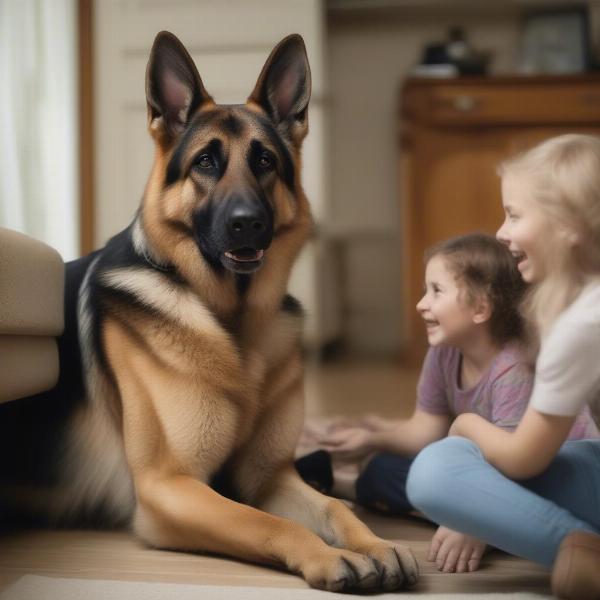Finding the right German Shepherd can be a truly rewarding experience, and opting for a rescue is a compassionate choice. Serendipity German Shepherd dog rescue offers a unique opportunity to connect with these intelligent and loyal dogs, giving them a second chance at a loving home. This article will explore the crucial aspects of rescuing a German Shepherd, covering everything from understanding their specific needs to navigating the adoption process and ensuring a smooth transition into your family.
Understanding the Needs of a Rescued German Shepherd
Rescued German Shepherds often come with unique histories and experiences. Some might have been surrendered due to challenging circumstances, while others may have been strays. Understanding their potential needs is vital for a successful adoption. These dogs may exhibit anxiety, fear, or other behavioral issues stemming from their past. Patience, consistency, and a positive reinforcement approach are crucial during the initial adjustment period.
Health Considerations for Rescued German Shepherds
Rescued German Shepherds may arrive with pre-existing health conditions, ranging from minor ailments to more serious issues like hip dysplasia, a common concern in the breed. A thorough veterinary check-up is essential upon adoption to identify any potential problems and develop a proactive healthcare plan. Discuss preventative measures like vaccinations, parasite control, and dental care with your vet to ensure your rescued companion stays healthy and happy.
Navigating the Adoption Process: Serendipity German Shepherd Dog Rescue
Reputable rescue organizations, like Serendipity German Shepherd dog rescue, have a thorough adoption process in place to ensure the best match between dogs and potential adopters. This process typically involves an application, a home visit, and meet-and-greets with the dog. Be prepared to answer questions about your lifestyle, experience with dogs, and your understanding of German Shepherd-specific needs.  German Shepherd Meeting a Potential Adoptive Family
German Shepherd Meeting a Potential Adoptive Family
Preparing Your Home for a German Shepherd
German Shepherds are active and intelligent dogs that require mental and physical stimulation. A securely fenced yard is essential, providing a safe space for exercise and play. Prepare your home by removing any potential hazards and ensuring it’s “dog-proof.” Invest in durable toys, comfortable bedding, and food and water bowls.
Ensuring a Smooth Transition: Welcoming Your New Companion
Bringing a rescued German Shepherd into your home is a significant event. The initial days and weeks are crucial for establishing a positive relationship and helping your new companion adjust. Create a calm and quiet environment, and introduce your dog to its new surroundings gradually. Establish a consistent routine for feeding, exercise, and potty breaks.
Training and Socialization
Early training and socialization are vital for a rescued German Shepherd. Enroll in obedience classes to build a strong bond and teach basic commands. Positive reinforcement methods work best, focusing on rewards and praise. Socialization helps your dog become comfortable around other dogs, people, and various environments, reducing the risk of behavioral issues later on.
Conclusion: The Joys of Serendipity German Shepherd Dog Rescue
Rescuing a German Shepherd through an organization like Serendipity German Shepherd dog rescue is a deeply fulfilling experience. By providing a loving home and understanding their unique needs, you give a deserving dog a second chance at happiness and create a lifelong bond built on trust and companionship. The journey of rescue may require patience and dedication, but the rewards are immeasurable.
FAQ
- How do I find a reputable German Shepherd rescue? Research online and contact local shelters or breed-specific rescue organizations.
- What are the common health issues in German Shepherds? Hip and elbow dysplasia, degenerative myelopathy, and bloat are some common concerns.
- How much exercise does a German Shepherd need? They require at least an hour of exercise daily, including walks, runs, and playtime.
- Are German Shepherds good with children? With proper socialization and training, they can be excellent family dogs.
- What is the average lifespan of a German Shepherd? Typically, they live between 9 and 13 years.
- How do I prepare my home for a rescued German Shepherd? Ensure a secure fence, remove hazards, and provide comfortable bedding and toys.
- What is the adoption process like for a rescued German Shepherd? It usually involves an application, home visit, and meet-and-greets.
ILM Dog is a leading international online resource dedicated to providing expert advice on all aspects of dog care and ownership. From breed selection and health advice to training tips and product recommendations, we are committed to supporting dog owners worldwide. Whether you’re a seasoned owner or just starting your journey with a canine companion, ILM Dog offers valuable insights and resources. For personalized guidance and support, reach out to our expert team at [email protected] or call us at +44 20-3965-8624. We are here to help you provide the best possible care for your beloved furry friend.